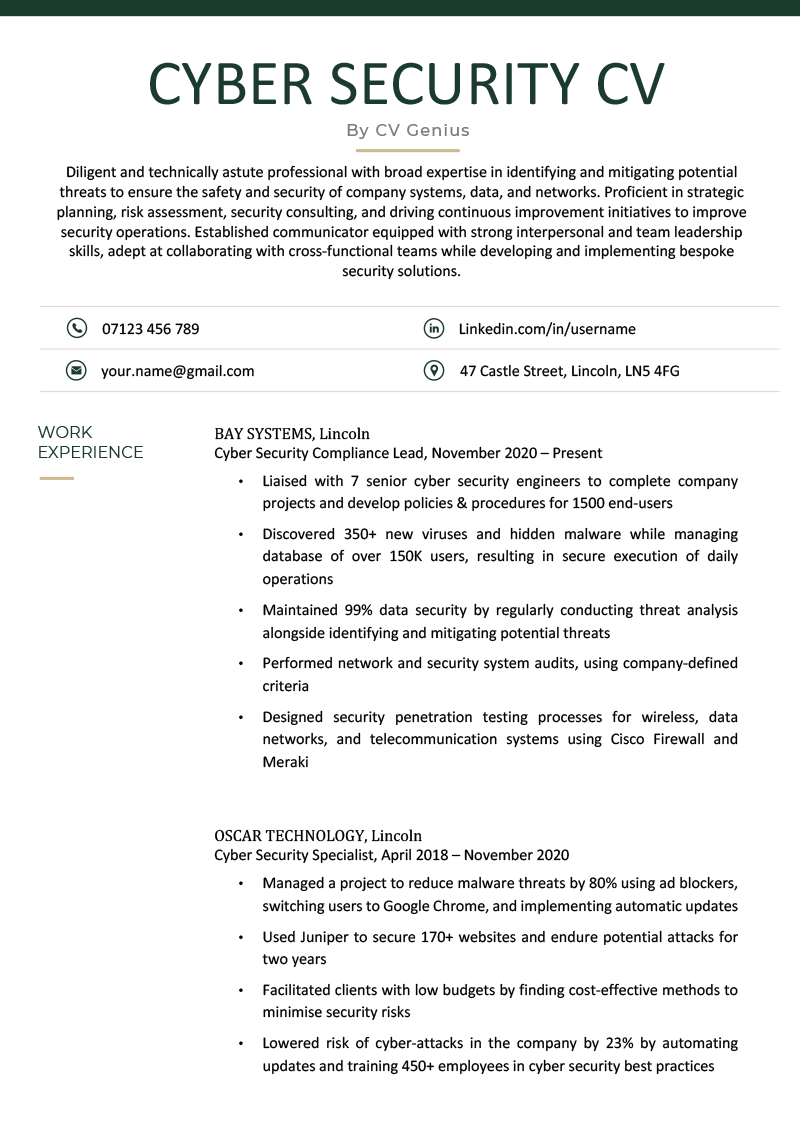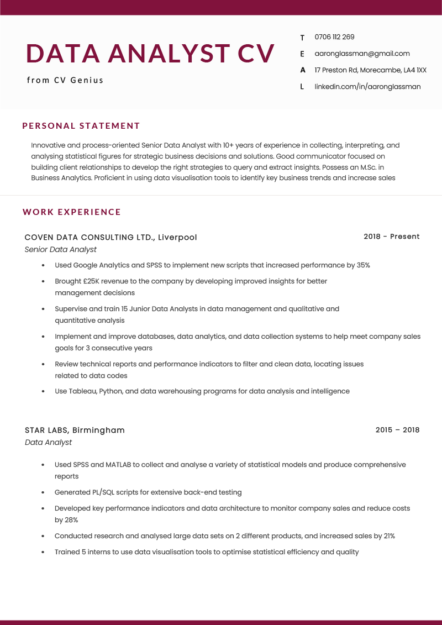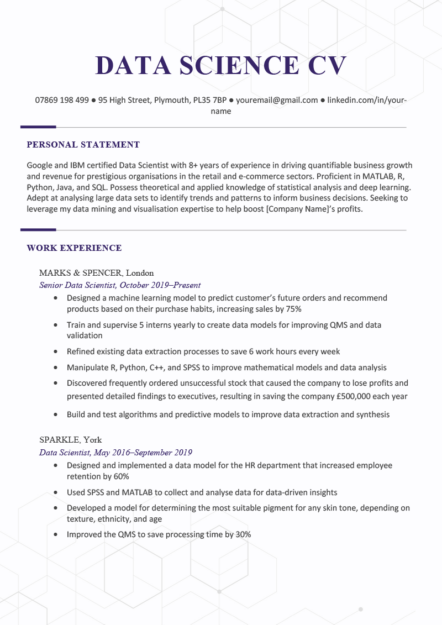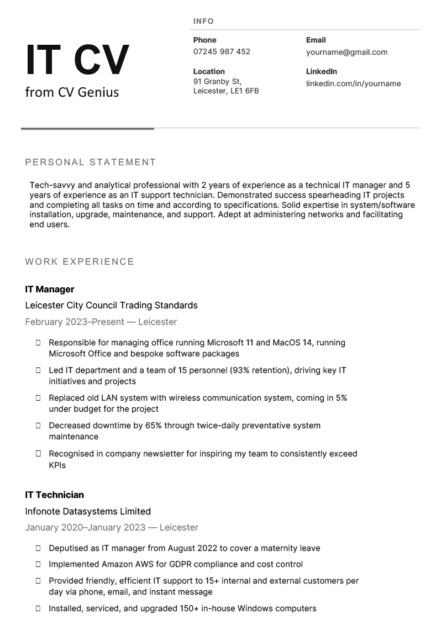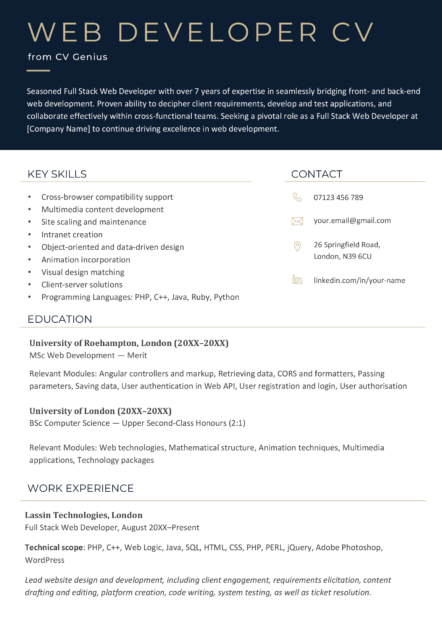Ensure your CV layout is structured to best highlight your unique experience and life situation.
Cyber Security CV Template (Text Format)
PERSONAL STATEMENT
Diligent and technically astute professional with broad expertise in identifying and mitigating potential threats to ensure the safety and security of company systems, data, and networks. Proficient in strategic planning, risk assessment, security consulting, and driving continuous improvement initiatives to improve security operations. Established communicator equipped with strong interpersonal and team leadership skills, adept at collaborating with cross-functional teams while developing and implementing bespoke security solutions.
WORK EXPERIENCE
Bay Systems, Lincoln
Cyber Security Compliance Lead, November 2020 – Present
- Liaised with 7 senior cyber security engineers to complete company projects and develop policies & procedures for 1500 end-users
- Discovered 350+ new viruses and hidden malware while managing database of over 150K users, resulting in secure execution of daily operations
- Maintained 99% data security by regularly conducting threat analysis alongside identifying and mitigating potential threats
- Performed network and security system audits, using company-defined criteria
- Designed security penetration testing processes for wireless, data networks, and telecommunication systems using Cisco Firewall and Meraki
Oscar Technology, Lincoln
Cyber Security Specialist, April 2018 – November 2020
- Managed a project to reduce malware threats by 80% using ad blockers, switching users to Google Chrome, and implementing automatic updates
- Used Juniper to secure 170+ websites and endure potential attacks for two years
- Facilitated clients with low budgets by finding cost-effective methods to minimise security risks
- Lowered risk of cyber-attacks in the company by 23% by automating updates and training 450+ employees in cyber security best practices
Brainnest, Canterbury
Cyber Security Intern, May 2016 – March 2018
- Supported senior specialists in optimising overall cyber security procedures across the organisation
- Assisted in identifying operational requirements and delivering robust solutions to ongoing cyber security issues
- Monitored IT security systems and actively responded to incident reports
EDUCATION
University of West London (2012–2016), London
BSc (Hons) in Cyber Security (Upper Second-class Honours)
Lincoln Secondary School,(2005–2012), Lincoln
A-Levels: ICT (A*), Maths (A), English Literature (B), Spanish (B)
CERTIFICATION
- CISSP: Certified Information Systems Security Professional — ISC (2018)
- CISM: Certified Information Security Manager — ISACA (2017)
- JNCIE-SEC: Security, Expert — Juniper (2017)
- Cisco Meraki Solutions Specialist — Cisco (2016)
KEY SKILLS
- Cyber security operations
- Threat assessment & mitigation
- Penetration testing
- Malware analysis
- Network security
- Data security
- System maintenance
- Recovery planning
- Solution architecture
How to write a great cyber security CV
Before you begin writing, make sure you know how to write a CV in a way that best emphasises your strengths.
The cyber security industry is booming. With the expansion of technologies like the Internet of Things, cryptocurrency, and e-commerce, the need to keep our systems safe has skyrocketed.
According to a government report, the average number of cyber security job postings in the UK increased by 58% between 2020 and 2021, reflecting significantly higher growth than in other industries.
Not only is cyber security in high demand, but it also pays well. Starting salaries in this vital business range between £25,000 and £35,000, and it’s possible to earn over £70,000 in senior roles.
Cyber security is perfect if you’re looking for a career that is both interesting and challenging. However, it’s also a competitive industry, and you’ll need to write a compelling CV if you want a shot at the best jobs.
In industries like cyber security, simple CV templates are usually best for displaying your qualifications in a professional manner.
Here are a few things you should do to optimise your CV and maximise your chances of getting the job you want.
1. Include the right cyber security skills
When employers are looking to fill a cyber security opening, they’ll search for specific skills. Generally, cyber security roles require a combination of hard skills (industry-specific skills) and soft skills (skills you aquire naturally). The required skills will vary between openings, so it’s important to review the job advert thoroughly before you start preparing your CV.
Some of the most important hard skills for cyber security include:
- Network security
- IT security
- Web security
- Information security
- Cybersecurity risk management
- Cybersecurity controls and procedures
- Data security
- Security incident response
Ensure you include specific technologies and methodologies within your cyber security CV. Fail to do so and you’re unlikely to be approached by recruiters or have your application taken through to the interview stage. Why? Firstly, because it needs to be searchable. And secondly, if someone non-technical is reviewing your CV against a list of keywords they’ve been given, they might think you aren’t qualified for the role when you are! – Matt Collingwood, Managing Director at VIQU IT Recruitment
Here are some valuable soft skills for cyber security work:
- Analytical skills
- IT experience
- Programming experience
- Problem-solving skills
- Communication skills
- Organisational skills
- Ability to work within a team
2. Demonstrate any highly relevant certifications
Depending on the position you’re applying for, an industry-related certification may be a requirement. If so, make sure your essential certifications are easy for the employer to locate by including them in your personal statement.
If a certification is relevant but not essential to the position, add it to your skills and work experience sections.
There are several valuable industry-related certifications:
- Systems Security Certified Practitioner (SSCP)
- Certified Professional (CCP) scheme
- Certified Information System Security Professional (CISSP)
- Certified Information Security Manager (CISM) certification
- Certified Ethical Hacker (CEH)
- Cloud Security
- Cyber Incident, Planning and Response (CIPR)
- General Data Protection Regulation (GDPR)
3. Use the right keywords for your cyber security CV
Given the competitiveness of many cyber security roles, employers often use keywords to speed up their searches and filter out irrelevant or underqualified candidates. You’ll need to identify and include these keywords on your CV if you want it to be noticed.
Similarly, watch out to use any specific job title the company uses. Check the job advert to see what that is, and add it to your CV underneath your name.
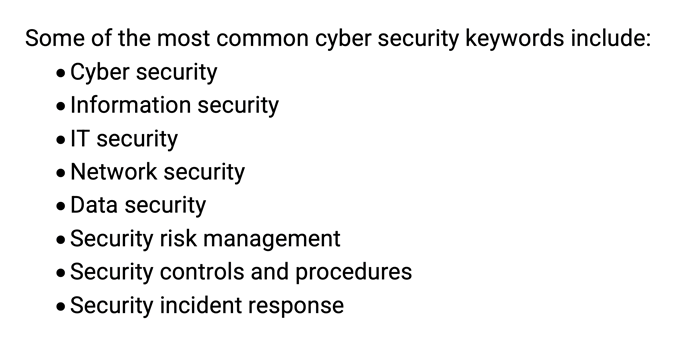
Remember, it’s always best to read the job description thoroughly to identify which keywords are best to use.
Cover letters are standard in the IT industry, so create a cover letter in minutes using AI-powered software.

